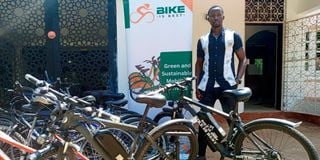
Jonathan Otieno, the founder of Bike Is Best Kenya.
Bicycles are considered a budget-friendly transport option for those unable to afford motorised vehicles, especially in villages across the country. But what if bicycles could offer more than just an affordable alternative?
Countries like the Netherlands and Denmark have shown that cycling can thrive anywhere, with many cities worldwide maintaining or reintroducing cycling as a primary mode of transportation.
As the world struggles with the impacts of climate change, one of the key contributors to global warming is the emission of greenhouse gases from the transportation sector. Motorised vehicles are among the most significant sources of carbon dioxide (CO2) emissions.
To combat climate change and meet global emission reduction targets, a transition to greener modes of transport is crucial. The transport sector remains one of the most challenging to decarbonise, primarily due to the heavy reliance on fossil-fuel-powered vehicles for personal, commercial, and public use. However, cycling and e-biking offer a promising solution to reduce carbon footprints.
Jonathan Otieno, the founder of Bike Is Best Kenya, is promoting green micro-mobility solutions in Mombasa. His company is at the forefront of encouraging eco-friendly, active transportation alternatives.
"Our mission is to reduce carbon emissions, promote active transportation, and improve air quality in urban areas. By offering a variety of electric and traditional bicycles, we provide a sustainable, cost-effective solution for short trips under five miles," he says.
Bike Is Best Kenya aims to fill the gap in affordable, sustainable transportation options that address urban congestion and reduce the environmental impact of the country’s fast-growing cities.
Otieno's journey in founding this initiative was fueled by his deep passion for sustainability and the environment.
"I always had a passion for sustainability. I realised there was a growing need for green transportation in Kenya, and bicycles were a perfect solution," he explains.
E-bikes, electric bicycles equipped with a motor that assists pedalling, are eco-friendly and versatile, offering three modes: fully electric, manual, and pedal assist. E-bikes are particularly well-suited for urban environments, providing a practical and sustainable alternative for commuters.
“I saw a gap in Kenya's transportation system, given urban congestion and limited affordable mobility options. Public buses and cars contribute to carbon emissions, traffic, and pollution. Bicycles and e-bikes offer a solution, but these alternatives were scarce," he says.
Bike Is Best Kenya was founded with a modest investment of Sh600,000 from personal savings. The venture began with five manual bicycles. He actively promoted the concept of green mobility through social media and community outreach. Gradually, he garnered support as more people recognised the benefits of cycling for commuting, leisure, and tourism.

Jonathan Otieno, the founder of Bike Is Best Kenya.
"It was not easy at first, but I believed in the potential for change. As the demand for cycling grew, so did my vision for expansion," he says. Over time, the business evolved, introducing e-bike and manual bike rentals to meet the needs of urban commuters, tourists, and local residents.
Today, Bike Is Best Kenya’s offerings include e-bikes with pedal-assist technology that are suitable for areas with high temperatures, like Mombasa, where cyclists can benefit from the electric motor's assistance to avoid sweating.
Otieno acknowledges that promoting a cycling culture has been challenging. In a country where car ownership is often seen as a status symbol, advocating for cycling has not been easy. Nevertheless, he remains committed to changing this narrative, particularly by emphasising the environmental and health benefits cycling offers.
His commitment to green mobility was further strengthened when his company hosted a side event at the Africa Climate Summit and Africa Climate Week in Nairobi, sponsored by the UNFCCC. This opportunity helped raise the company's profile and solidify its dedication to sustainable urban mobility.
One of the key factors contributing to the growing popularity of the business is its affordability. While e-bikes can be costly, Otieno’s team offers interest-free instalment payment plans for up to 18 months, making them accessible. Each e-bike costs approximately Sh120,000.
To cater to various urban commuters, they provide a wide range of bicycles and e-bikes for leisure riders, long-distance commuters, and tourists exploring the cities.
“What sets us apart is our unique 3-in-1 e-bike model, which has been very well received. Since launching, the demand for bike rentals and e-bike sales has exceeded expectations. We have rented bikes to over 1,480 clients at Sh2,500 per full day and sold more than 12 e-bikes. Notably, 27 per cent of our bike rental clients were foreigners,” he says.
Otieno attributes this to the quality of the bikes and the growing awareness of the need for alternative, sustainable transportation solutions. The business has gradually expanded from an initial five bikes to a fleet of 80, including manual bikes and e-bikes.
Bike Is Best Kenya faced challenges typical of start-ups, including logistics, supply chain issues, and scaling infrastructure. A major hurdle was the lack of adequate cycling infrastructure in urban areas, making safe navigation difficult. The business has also had to address limited awareness about the benefits of cycling.
Otieno overcame these challenges by forming partnerships with local businesses, advocating for better cycling infrastructure, and offering flexible payment options. These efforts helped meet the growing demand for bike rentals, especially during peak tourist seasons.
The business has a dedicated team comprising key roles such as the CEO, project manager, technician, tour guides, and digital marketer.
Otieno’s plans include expanding the fleet to new regions such as Kilifi, and transitioning to a fully electric bike fleet by mid this year. He is also focused on firming up partnerships with major hotels to expand services for tourists, positioning Bike Is Best Kenya as the leading choice for sustainable transportation.
“We offer affordable rental options to make bicycles and e-bikes accessible to everyone, particularly underserved communities in urban areas. Through partnerships with cycling clubs, government agencies and local businesses, such as bike shops, we are strengthening the cycling culture and advocating for improved infrastructure,” he notes.
The enterprise is committed to environmental sustainability, having already planted 23,800 mangroves at Mkupe Conservancy.
With the rising demand for sustainable urban mobility in Kenya, the business has ambitious plans for the future. Besides expanding its fleet, the business also plans to introduce e-scooters, and amplify its advocacy for improved cycling infrastructure across the country.
"With the support of local governments, businesses, and the public, we aim to create a lasting impact on Kenya’s transportation landscape, making urban mobility greener, healthier, and more inclusive for all," he says.









